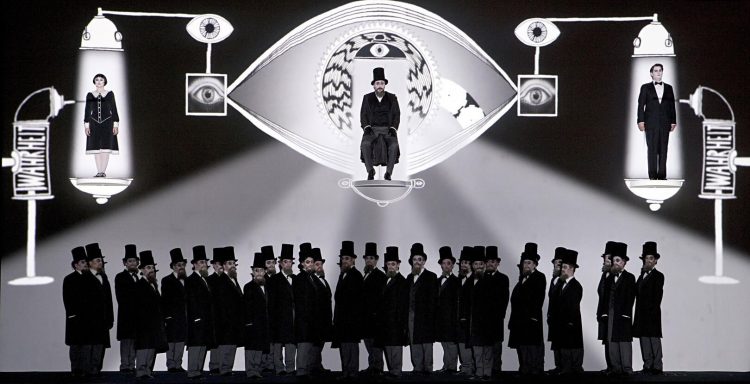When word reached Kirill that a production of his favorite opera “The Magic Flute” was touring from his native Berlin, he somehow convinced fellow Berliner Max to join him. What follows is a rough transcript of the bilingual debate that ensued, some of it edited for clarity, some translated from the German.
Kirill: There’s something about this plaza, these three buildings of the Lincoln Center with their narrow columns which repeat in stone the water columns of the fountain. Come to think of it, they are just like the three temples of Mozart’s opera: Wisdom, Reason… what was the third?
Max: Nature. You would forget that one. I agree the space has a certain bourgeois swagger. But the Lincoln Center is a long way from the fringe.
Kirill: Do you regret I brought you here to help me review The Magic Flute?
Max: No, the animations were excellent. But your scheme to convert me to a love of opera has failed. For me the opera will always be the most fascistic of art forms. This one’s glorification of Supreme Leader for Life Sarastro is merely a case in point. And anyway, what is there to say about The Magic Flute that hasn’t been said a hundred times a hundred years ago?

Kirill: So you claim to be unmoved as Pamina sang ‘Ach ich fühl’s’? You felt no joy when Papageno found his Papagena? No chills when Tamino cries in despair “Oh endless night when will you be gone, when will my eyes find the light?” and an unseen chorus answers softly “Soon, soon, young man, or never.” Look at my arm! The memory alone raises bumps!
Max: Yes, you leaned forward in your chair like a child at story hour. How is it possible to criticize anything from such a short distance? One should, as Brecht said, light a cigar, lean back, and watch critically.
Kirill: The very image of ‘bourgeois swagger’ from a poet who, like a true Marxist intellectual, claimed working class status while indulging a taste for fine cigars and sports cars. Dramatic art has always been about identification, and Brecht’s best plays are no exception.
Max: I see this is going to get personal. I didn’t hate your favorite opera, Kirill. And the animations, as I said, were excellent.
Kirill: They were amusing, admittedly, but they pulled me out of it.

Max: Exactly the point! This is the Komische Oper, remember, a few blocks from Brecht’s Berliner Ensemble. Though it says here the animations were done by British theatre group 1927 under the direction of Paul Baritt. A very successful and subversive collaboration, I think. My favorite was when Papageno’s bells transformed the villain’s henchmen into dancing cabaret girls through video alone.
Kirill: But Max, the singers were pinned to the screen the whole time. It felt so limiting. Opera singers reduced to flat sprites. Mozart and Schikaneder’s vast kingdom of the imagination reduced to a two-dimensional video game.
Max: Again, exactly the point. There is even a moment when Pamina and Papageno jump from roof to roof like Super Mario and the princess.
Kirill: The animations are so episodic they completely disrupt the unity of the whole. So instead of a work with depth and coherence, we are served something flat and fragmentary—a series of brief levels in a flash game played on an iPad. Which of course explains the production’s enduring popularity.
Max: (tsking) Ever the elitist.
Kirill: There is nothing elitist in wanting opera for opera’s sake. If one has a taste for fine steak one doesn’t go smothering it in ketchup just to earn the approbation of the masses.
Max: Explain to me then what attracts you to this work. To me it resembles not so much a fine steak as a sugary confection, for which animations are a perfect match.

Kirill: There is so much to say. Whole books have been written, and I have read several—though this is a consequence of my fascination, not its cause. To appreciate the genius of this opera requires a certain receptivity. When approached in the right frame of mind, at the right time of life, The Magic Flute, how should I say, initiates the viewer. Everything—the symbolic story, the archetypal characters, the pregnant dialogues (which were sadly lacking) and most of all Mozart’s matchless music—everything, I say, conspires to turn the soul from darkness to light. And before you object, remember that one does not have to believe in the soul as an objective reality to experience it subjectively, any more than one has to believe in Cupid to feel his arrows.
Max: So watching this opera makes one a Freemason?
Kirill: Freemasonry is a red herring. The symbolism runs much deeper. It’s as old as alchemy, hence the setting in Egypt. There simply isn’t time to explain it all in what is supposed to be a short review. Of tonight’s performance I will say this: The singers did an extraordinary job despite being pinned down like butterflies. Aleksandra Olczyk somehow nailed two of the world’s most acrobatic arias standing rigid in a giant spider mask. I fell in love with Vera-Lotte Böcker’s Pamina, trembled with Evan Hughes’s Papageno, triumphed with Aaron Blake’s Tamino. And I’ll admit, the animations were clever and occasionally beautiful, and the synchronization between singers, actors, and projections was flawless, thanks no doubt to close collaboration between conductor Louis Langrée and co-directors Suzanne Andrade and Barrie Kosky. I only wish there had been less screen time and more scenes in the third dimension.

Max: When you talk opera your eyes get that crazed look like after too much vodka. I feel a little like the guy who smokes grass for the first time and feels nothing, meanwhile his friend is transformed. One thing is certain: Your love of opera is no affectation. But it remains to be seen whether your so-called receptivity is merely a weakness for what Nietzsche calls Rausch, which, how would you translate? Intoxication?
Kirill: I am intoxicated, yes, with the nectar of the gods. If only you would try a sip, you would see…
Max: That’s what everyone says who wants you to drink their Kool-Aid. Thank you, but I will stick to my Scotch and cigars. Which is not to say I regret going. There is plenty to admire in this Magic Flute, even from a distance.
For more information about this production, visit www.lincolncenter.org

